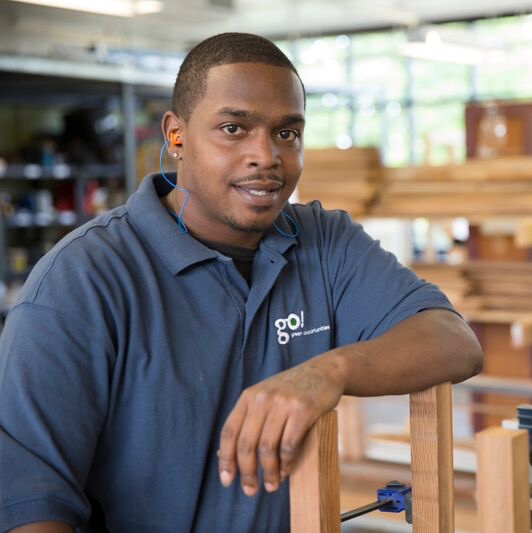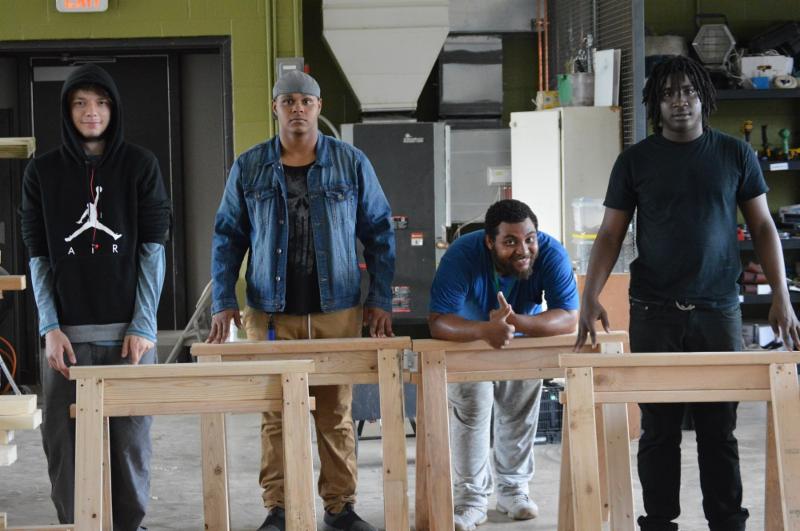An Interview with Eric Smith, Green Opportunities YouthBuild Program Director
This spring, Tracy and new Circle Forward coach/trainer, Daniel Suber, started a new training curriculum in consent-based decision-making with program participants at Green Opportunities. These students are enrolled in the Youthbuild Program, a tuition-free pre-apprenticeship program designed for out-of-school youth in Buncombe County, aged 16-24.
Last week, I interviewed Eric Howell, Green Opportunities’ YouthBuild Program Director.
A cornerstone of the YouthBuild Program is Leadership Development:
“One of YouthBuild’s core underlying convictions, confirmed over the past 40 years, is that young people are capable of playing a leadership role and if encouraged to do so will bring enormous energy, creativity, and imagination to the work, as well as ideas that are well informed by the reality they face.” (From YouthBuild website)
So that students can learn, practice and use the skill sets for leadership, YouthBuild programs also include the creation of a Student Government Association and Youth Policy Council. This allows students to participate in the decisions that affect them and creates more buy-in for those decisions.
Here is a transcript of Michelle’s interview with Eric Smith.
Michelle: So, how did Green Opportunities come to invite Circle Forward to develop a training for Green Opportunities students?
Eric: At first, we went to Julie Mayfied and we were going to have her do a training in Robert’s Rules of Order. [Julie serves on Asheville’s City Council and is also Co-Director of MountainTrue, one of the region’s leading environmental nonprofits.] Julie said she’d be happy to do that training, but suggested that Circle Forward actually might be a better fit.
As we thought about it, really, Robert’s Rules is not as widely used as it once was. It’s starting to become outdated. The only time you really see it used is in Council meetings or Congress meetings. You really don’t hear it being used in business meetings.
When we heard of the consent model, we thought “hold on, this right here might fit with the students a whole lot better.” Learning the consent model and Range of Tolerance has helped our classes even outside of the student government.
Michelle: Can you say more about that?
Eric: A lot of our students come here from marginalized communities, from some of the rougher communities. So a lot of their thinking is street mentality, like “It’s my way or the highway” or “They’re not going to listen to me anyway, so I’m not going to say anything.”
With the consent model, it really opened them up to believe “Hey, my voice does count.” Or, “I don’t have to say as much now because I have peers that can help me out with that.”
In our first cohort, there was a lot of arguing and bickering back and forth, a lot of confusion. And then after they started hearing about Range of Tolerance and they had the vocabulary to say, “These are my boundaries”, it really gelled the group together even more. I literally heard those students say things like, “See, that right there is out of my range of tolerance.” And I thought, “they are really taking heed to this.”
Then the second group was a more quiet group. They rarely talked. They were always keeping to themselves. Once they started the Circle Forward training, it started opening them up, because everybody has a say so. There is no way that only one or two people can be the only ones who talk. Everybody puts in some type of input. After they got used to that, some of my quieter students really opened their shells. They’re coming to us and really talking to us now.
Michelle: And what I’ve found in the past, and you can tell me if this is true here, a lot of times those most quiet ones are holding some amazing wisdom and insights. We would never have gotten the benefit of them, if they didn’t feel like their voice mattered. Using rounds, in the consent model, you can always pass, but you’re always going to be offered the floor. So circle members know their turn is coming around.
Eric: And that’s another thing I liked about how Tracy and Daniel ran the training. If students passed a couple of times, the next time their turn came around they didn’t just let them pass.
Michelle: Oh really, not letting them opt out of participating?
Eric: Right, not letting them get into the mode of just pass, pass, pass. They’d call out those students and say, ‘You’ve passed a couple of times. We really want to hear what you have to say. We really want to know what you’ve got going on.” The students have built a good rapport with Daniel, with him being from the same community that these young people are from. And Tracy is wonderful. That was one of the biggest things we were afraid of. Are they going to accept her as well? And they do, just because Tracy gives them the floor and really gets them to engage with the process.
Michelle: We’re so gratified to have Daniel as part of Circle Forward Partners. He has a past relationship with Green Opportunties, right?
Eric: Actually, Daniel was part of the first cohort of Green Opportunities participants, our weatherization training program. After that he decided to go to A-B Tech and pursue college instead of going straight into the workforce. In his third year of college, he served on GO’s board. And now he’s really one our community leaders, involved in a lot of different things.
Michelle: So tell me what has the staff learned through these two trainings so far?
Eric: The consent model has allowed the students to give us feedback without being scared or nervous of the consequences. Through talking with Tracy and Daniel, our staff have all come to consent that we’re going to open the floor and let everything come out, because that’s the only way we can fix problems. Even if we don’t like it, we still need to know so we can address issues that come up.
This last circle that we had, we said to the students, “These are the norms we came up with together by consent. What is working and what is not working? We want you all to be 100% honest with us.”
And we got some feedback from some of the students that they were feeling talked down to. Staff didn’t even know they were coming across that way. And the students were able to hear the staff’s experience, how much it sucks when students just don’t show up when they’ve agreed to. It really gelled the group. Right after we had that feedback, the circle [students and staff] came up with a new incentive system for the program, by consent.
Michelle: Right! So the students and staff got to hear each others’ objections, and what was out of the range of tolerance for each of them. The value of drawing out and hearing objections is not something that our typical business culture supports, but with the consent model we find a way to adjust the solution so that everyone can support it.
Eric: Yes.
Michelle: So we’re going to bring this consent-based goverance model back again to the next cohort. What’s going to be different this time?
Eric: The big difference this time, compared to last time, is that we’re going to do it earlier in the course. We’re going to do it in our “Mental Toughness” week-long orientation, where we see if this program is a good fit for the student. We really want to bring Circle Forward to the forefront so that when we get in the class, we can start using some of the language and concepts from the beginning.
Michelle: Tracy and Daniel began this training with the group developing and consenting to a set of shared values and norms.
Eric: Yes, the last class reviewed the norms and values that the first class developed, made some adjustments to them and then consented to adopt these for this class.
Michelle: Great, so you can can start building that culture of consent from the beginning.
Eric: Yes, and I’ve even heard some of the students saying, “Hey, I think I’m going to take this home. I’m going to see if it will work at home as well. It’s working here.” Students in that first cohort especially were saying, “Have y’all noticed our class is different since we’ve been working with Circle Forward and we’re using the consent model.” Karen, a staff member who was in the job development role and then an instructor role, said being able to go back to that consent model with students was very helpful and made everything gell for her.
Michelle: Any other thoughts?
Eric: I really think the consent model needs to be taught in high schools. It would help out with culture. I think it would work a whole lot better with marginalized communities because a lot of them growing up don’t really get a voice or have the opportunity to say, “Hey, my voice counts in what matters.” Seeing it with my guys, how the consent model really opens them up, I really think it would make things so much better.
Contact us
We’d love to hear about your work.



